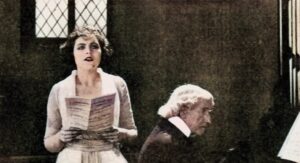The landscape of Opera in Cinema boasts a rich and varied history, yet few cinematic periods present as fascinating a study as the Silent Film History era. Among these early gems, Alan Crosland Films stand out, with his 1920 feature, Greater Than Fame Film, offering a profound, albeit wordless, exploration of the demanding Operatic Dramaturgy of an operatic life. This film, a notable example of Early 20th Century Film, challenged conventional storytelling by depicting the struggles and triumphs of a singer without the benefit of synchronized sound, forcing a unique engagement with the art form.
Released at a pivotal moment in both cinematic and operatic evolution, “Greater Than Fame” delves into the raw realities of pursuing a singing career. Starring esteemed artists of its time, the narrative follows Margaret Brooke, a young woman whose vocal training and relentless quest for recognition plunge her into a series of difficult predicaments. The film captures the essence of an artist’s struggle, illustrating the fight for opportunity and the intense personal sacrifices often required to achieve artistic prominence.
What distinguishes this Silent Film History piece, particularly for its operatic subject matter, is its reliance on visual storytelling and physical expression. Without spoken dialogue or synchronous music, the film compels its performers to embody their characters with an unparalleled depth. The body and inherent musicality of the performances become the primary vehicles for conveying emotion and plot, allowing the pursuit of fame and love to unfold in a uniquely transcendental manner, demanding a more profound interpretation from its audience. This Operatic Dramaturgy is visually compelling.
Far from a simple drama, “Greater Than Fame” operates on a meta-level, reflecting societal concerns pertinent to its era and surprisingly resonant today. Reed and Crosland crafted a story that explored the complex interplay between career ambition, moral integrity, ethical dilemmas, and the timeless pursuit of true love. This narrative foresight gives the film a powerful dramaturgical weight, particularly in a post-war world grappling with the impact of burgeoning capitalism on communal relations and individual aspirations.
Indeed, the Greater Than Fame Film can be viewed as an early cinematic symbol illustrating the multifaceted costs associated with an operatic career—not merely financial, but profoundly interpersonal. During the operatic “Silver Age,” when the industry was firmly established yet its societal position remained fluid, this film acutely portrayed the pressures and compromises inherent in professional singing. It highlighted that despite opera’s evolving into a modern, creative medium amidst the rise of jazz culture, the pathway to success was fraught with challenges.
The year 1920, renowned in operatic history for significant premieres, also marked a critical juncture for Opera in Cinema. While silent, opera-based features were abundant, films like “Greater Than Fame” represented a closing chapter for one cinematic era and the emergent birth of another. This transitional period saw filmmakers experiment with new narrative approaches, solidifying opera’s potential as a recurrent and compelling theme on the silver screen, setting a precedent for future cinematic interpretations.
Though now considered a lost film, the enduring legacy of Alan Crosland Films and particularly “Greater Than Fame” lies in its profound realism and innovative depiction of life as an opera singer. It masterfully demonstrated that lived experiences, with all their inherent challenges and emotional complexities, can carry as much dramatic weight as pure fiction. The film’s message that “real life is the most operatic thing we can find” resonates, cementing its place as a significant Early 20th Century Film that captured the essence of human struggle and self-discovery.






Leave a Reply